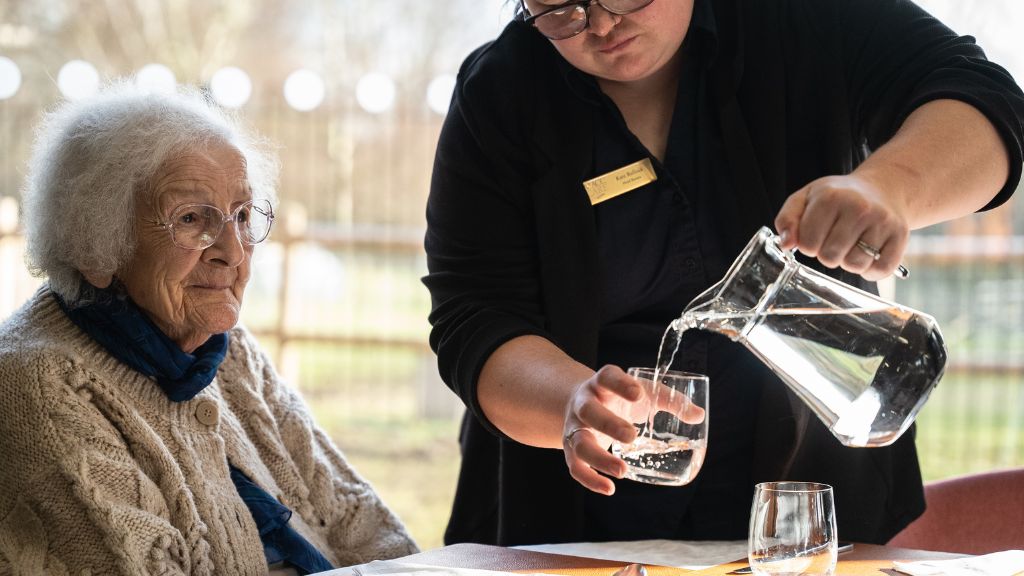Care Managers Show: The management challenge

Care home managers often have extensive knowledge of care provision but may be less confident in their management ability. Charlotte Goddard finds out how they can develop their skills.
New care home managers are not always prepared for the day-to-day challenges of their role. “Managers of care homes are typically very skilled carers but often have never had any training or education in leading people and services,” says Stephanie West, head of school at Arden University’s School of Health and Care Management.
A manager will find they have a raft of new responsibilities, which may include finances, regulatory issues, supervising staff, dealing with HR issues, recruitment, health and safety, marketing the setting, and understanding profit and loss. Phillis Dzowa has been manager of Barchester Healthcare’s Newington Court Care Home since 2021. She says care home managers need to be able to communicate successfully with relatives, residents, team members and other healthcare professionals and have a firm grasp of regulatory requirements.
“In my previous role as deputy manager I was just using my clinical skills, but when I became manager I had to start thinking outside the box,” she says. “When you are leading a whole home you have to be confident in using your own initiative.”
In Scotland care home managers are required to hold or gain both a degree- level practice qualification (usually SVQ social services and healthcare at SCQF Level 9) and a management qualification at or above SCQF Level 9. In Wales care home managers and those nominated to deputise are required to hold a Level 5 diploma in leadership for health and social care services (adults’ residential management) or one of a range of alternative qualifications.
The Skills for Care website says the “core qualification” for managers in England is the Level 5 diploma in leadership and management for adult care. The Care Quality Commission requires registered care home managers in England to have the “necessary qualifications, competence, skills and experience”, but doesn’t specify a particular qualification. Gaining or working towards the Level 5 can be viewed as a positive indication the person is fit to carry out the role, but is not a legal requirement.
The Level 5 diploma aims to equip learners to demonstrate an “in-depth understanding and effective practice in leadership and management for adult care services”. However, there are some concerns that it doesn’t go far enough to equip managers with the skills they need. “The Level 5 gives a nice footing of leadership and clinical work to get them thinking but it doesn’t really go into depth,” says Mel Dixon, leadership and management skills trainer at Barchester Healthcare. “Level 5 should be a minimum qualification, but it has been taken across the sector as that is what you need, and then you stop, because there just isn’t the time or the money for ongoing training,” says West. Skills for Care research found that establishments with higher levels of staff undertaking learning and development were more likely to receive higher CQC scores.
Some providers have created their own programmes to plug the gaps. Barchester has developed a leadership development programme mapped to Chartered Management Institute (CMI) standards. Training includes the Level 5 diploma but also covers additional content, with staff given the opportunity to progress to a Level 7 diploma in strategic management and leadership. New managers take part in three days of workshops including a day on operational finance and contracts. Dzowa says she found the focus on leadership skills rewarding. “I had a very supportive mentor who helped me get through some of the modules,” she says.
Not all providers can deliver in- house training but there are other options. Skills for Care offers a number of programmes including Moving Up, which supports black, Asian and minority ethnic leaders and managers, and Leading Change Improving Care, a national development programme for new and experienced managers of adult social care services.
Arden University offers a Level 6 chartered manager degree apprenticeship in health and social care, and a Level 7 senior leader apprenticeship plus MBA. “There is much more focus on leadership and management skills than is in the Level 5,” says West. “This includes the fundamentals of finance and resource planning, leadership of people and services, and how you manage efficiencies.”
CMI accreditation allows graduates to obtain a diploma in leadership and management alongside a degree in health and care. Apprenticeships are free for employers that pay the Apprenticeship Levy and highly subsidised for smaller employers. “We should be maximising the use of apprenticeships because of the way they are funded,” says West. The Level 5 diploma in leadership and management for adult care, for example, can be obtained as part of a leader in adult care apprenticeship.
However, some providers feel apprenticeships don’t work for them. Michael Beresford, head of learning programmes at Barchester, says the organisation tried delivering apprenticeships in-house but Ofsted requirements were too prescriptive.
Ofsted inspects the quality of apprenticeship training that is delivered by training providers. The six hours a week apprentices are required to spend ‘off the job’ can also be a sticking point for employers, although the time can be taken in two-hour or three-hour blocks.
“What the manager is learning, they will immediately feed back into the workplace as they progress through the apprenticeship,” says West. “Also it gives someone else a professional development opportunity to step up and manage the team for a few hours at a time.”
In a dynamic sector like health and social care it’s important to stay on top of changes in policy, practice and research, and managers need to be able to access quality continuing professional development throughout their career. Skills for Care offers a number of one-day courses for managers on specific areas including performance management, self-management skills, and workplace culture. Some providers offer their own menu of CPD options: Dzowa has access to a range of bitesize leadership webinars and workshops. “Learning doesn’t stop at Level 5,” she concludes.
Access free CPD sessions from Arden University and Skills
for Care at the Care Managers Show at NEC Birmingham on 30 June-1 July.
To book your free tickets click here: https://caremanagersshow.co.uk/




